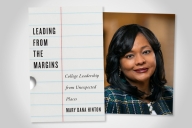You have /5 articles left.
Sign up for a free account or log in.
A new company is using an open-source approach to help institutions eager to phase out traditional textbooks for open education resources, but its efforts face an impediment: some instructors still believe a price drop in course materials means a similar drop in quality.
Lumen Learning, co-founded by Brigham Young University associate professor David Wiley and Kim Thanos, a higher education entrepreneur, will marry what the two described as an increased focus on the price of education -- particularly the price of textbooks -- with the “pervasive awareness” about OER among researchers.
“There is over $100 million poured into the creation of these OER, but walk into a classroom or a department at random -- the odds that you would find OER being used are practically zero,” Wiley said. “It’s an if-you-build-it-they-will-come situation. There really is a need for somebody to do that last bit of work.”
Wiley said the main reason why institutions have yet to embrace the OER movement is a "fear of the unknown" -- an ingrained suspicion that course materials available free of charge cannot rival traditional textbooks in quality. In an attempt to change this mentality, the company will provide consulting services to help institutions and professors integrate OER into their curriculums, then follow up with data-driven analyses to further strengthen those curriculums. The transition services will be priced at about $15,000, while the company is exploring an annual subscription model Thanos said would be less expensive than traditional textbook costs.
“This is never an initiative that’s going to be driven from the top down. That’s just not the way you work with the faculty,” Wiley said. “This is always going to be a coalition of the willing -- folks who are interested in improving learning outcomes and improving affordability for students, and who are willing to try new things.”
Despite lingering reservations, there is some evidence suggesting the OER movement is taking hold in higher education. Also on Monday, the Rice University-based OpenStax College announced a partnership with the publisher Wiley to publish biology textbooks through the online platform WileyPLUS.
Lumen Learning builds on the Kaleidoscope Open Course Initiative, an OER project also created by Thanos and Wiley. The project tested online materials in general education courses at eight institutions in an effort to reduce costs and increase student performance.
The results from Project Kaleidoscope convinced Thanos and Wiley to proceed with Lumen Learning. In a survey of participating institutions, most professors said their students were either equally or more prepared than students using traditional textbooks, and all of them said they were very likely to use OER in future courses. Similarly, 97 percent of students thought the free online resources were at least on par with past course materials -- with a majority saying they were better.
Negative feedback resembled the sort that is often associated with digital reading materials, including connectivity issues, confusing design and the lack a physical copy to annotate and highlight. But when asked to consider future courses differing only in the type of course materials required, about three-quarters of the students polled said they preferred the course with OER.
“It shows real promise, and we see an opportunity at this point to have a provider that can work with the community and bridge the gap between software and technology,” Thanos said.
Thanos and Wiley compared the OER movement to the growing interest in open-source software, and compared Lumen Learning to the operating system developer Red Hat, which they said helped foster the growth of the Linux platform.
“The goal is to become something like a Red Hat for open education resources,” Wiley said.
Cerritos College, in Norwalk, Calif., which originally participated in Project Kaleidoscope with OER courses in English, business and geography, is now expanding to include math, accounting, biology, reading, education, and earth sciences. JoAnna Schilling, vice president of academic affairs there, said her institution is actively pursuing ways to reduce textbook costs, but noted that relying on OER is not without its flaws.
“I think the biggest issue is still finding quality materials through open source,” Schilling said. “In many cases the faculty felt that much of their course materials could be found via OER, but that there were still some materials that had to be supplemented through traditional sources.”
Schilling’s criticism is a common concern among early adopters of OER, according to Thanos and Wiley. True to the open-source spirit, they described an ongoing process in which instructors refine and improve course materials to better suit their needs, then share it with their peers.
“Institutions realize that when resources are openly licensed, they have the opportunity to change them to better support student learning,” Wiley said. “That’s really where we see the learning game -- first getting students access to materials on the first day of class, then evaluating and changing resources based on learning results.”
Lumen Learning will initially be funded by the Shuttleworth Foundation, a nonprofit organization founded by South African entrepreneur Mark Shuttleworth. The Next Generation Learning Challenges, a grant program supported by the Bill & Melinda Gates Foundation, is funding an initiative to expand the number of institutions participating in Project Kaleidoscope
Going forward, Thanos said Lumen Learning will continue to emulate the open-source movement. Aside from helping institutions with the transition and evaluating results, the company will also make all its work available under the Creative Commons license.
“All of the work that we do we will openly share,” Thanos said. “Our intent is to accrue everything back to the community, but continue to provide support.”
The emphasis on free sharing has provided instructors with another cause for concern, according to Charles Snare, vice president of academic affairs at Nebraska's Chadron State College, another participant in Project Kaleidoscope. Snare said transitioning to OER is forcing professors to think about teaching in the same way they approach research.
"[W]e need to move away from a model of pedagogical solitude where every professor teaches on his own," Snare said. "[OER is] not a silver bullet and it’s not going to solve all our problems, but it’s one of many things that can be very helpful in addressing the concerns that people have about higher education."








